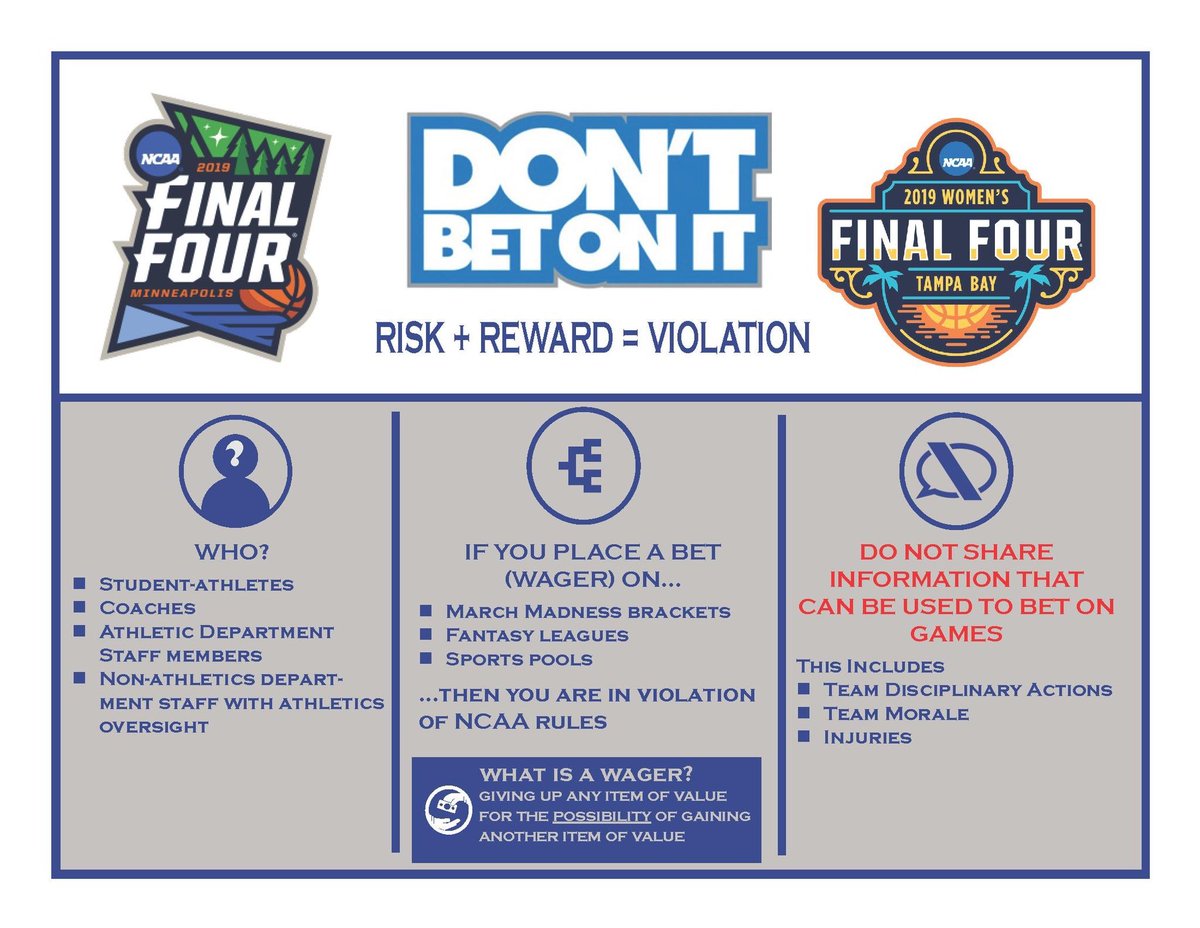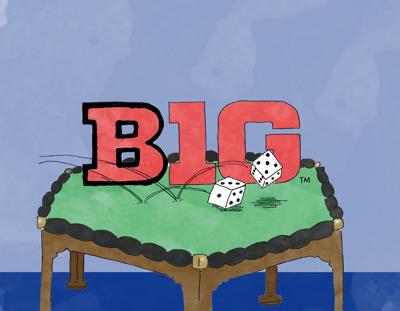Ncaa Athlete Gambling Rules
As an UVA student-athlete, you need to be mindful of many NCAA, ACC and University of Virginia rules and regulations that could affect you. This purpose of this website is to help you understand the many of these rules and also describe certain procedures you must follow (e.g. SAF, Transfer Procedures).
Student-Athlete Handbook
Continuing Eligibility
The NCAA has a prohibition in place against athletes gambling on sports, but prior to last summer, only the state of Nevada had legal, traditional sports wagering. Ten or more states could have legal sports betting by the end of 2019. The NCAA, headquartered in Indiana (which is close to legalizing sports betting), is concerned. Sports Wagering NCAA rules prohibit participation in sports wagering activities and from providing information to individuals involved in or associated with any type of sports wagering activities concerning intercollegiate, amateur or professional athletics competition. The NCAA will only review an athlete’s eligibility status if their status has been requested by a DI or DII college. This process will begin once you graduate high school, complete a minimum of 16 core courses—with a minimum 2.3 GPA average in these courses—and earn a qualifying ACT or SAT test score. NCAA Bylaws prevent student-athletes and members of athletic departments of member schools from knowingly: Providing information to organized gambling activities about college competitions Soliciting a bet on any college team Accepting a bet on any team representing an institution. The organization's top governing board voted unanimously to allow college athletes to be compensated, though the NCAA's three divisions must still craft their own rules and detail the specifics.
The NCAA requires all student-athletes be enrolled in a minimum of 12 (twelve) credit hours in order to practice and compete. The only exception to this rules applies to student-athletes who are in their last semester and need less than 12 (twelve) credit hours to complete their degree. In this situation, a student-athlete's academic dean MUST CERTIFY the student-athlete is enrolled in the appropriate classes to complete their degree and forward this certification to the Registrar's Office. If you are a student-athlete in this postition, please notify your athletics academic coordinator.
Credit Hour Requirement (NCAA)
Percentage of Degree Requirement (NCAA)
Grade Point Average Requirement (NCAA)
Extra Benefits Regulations
NCAA rules prohibit a student-athlete from receiving an 'extra benefit' from an institutional employee or a representative of UVA's athletics interest (i.e. booster).
16.02.3 Extra Benefit
An extra benefit is any special arrangement by an institutional employee or a representative of the institution's athletics interests to provide a student-athlete or the student-athlete's family member or friend a benefit not expressly authorized by NCAA legislation. Receipt of a benefit by student-athletes or their relatives or friends is not a violation of NCAA legislation if it is demonstrated that the same benefit is generally available to the institution's students or their relatives or friends or to a particular segment of the student body (e.g., foreign students, minority students) determined on a basis unrelated to athletics ability.
16.11.2.1 General Rule
The student-athlete shall not receive any extra benefit. The term 'extra benefit' refers to any special arrangement by an institutional employee or representative of the institution's athletics interests to provide the student-athlete or his or her family members or friends with a benefit not expressly authorized by NCAA legislation.
16.11.2.2 Other Prohibited Benefits
An institutional employee or representative of the institution's athletics interests may not provide a student-athlete with extra benefits or services, including, but not limited to:
NCAA Amateurism Guidelines
NCAA rules require all student-athletes to be amateurs in the NCAA sport which they participate. If a student-athlete competes as a professional, then he or she will no longer be able to compete as an intercollegiate student-athlete.
12.1.2 Amateur Status
An individual loses amateur status and thus shall not be eligible for intercollegiate competition in a particular sport if the individual:
Student-Athlete Employment
NCAA rules do permit student-athletes to work during their tenure at UVA.

Compensation may be paid to a student-athlete:
Compensation may not be based for value or utility that the student-athlete may have for the employer because of publicity, reputation, fame or personal following that he or she has obtained because of athletics. Further, the employee/employer may not use the student-athletes image, name or picture to promote the student-athletes employment.
All student-athletes and employers must complete the employment form from the link below affirming their understanding of NCAA rules.

/athlete-in-mid-air-doing-pole-vault-184629865-5b2533fa119fa8003612d712.jpg)
NCAA Agent Information
Student-athletes with remaining eligibility may engage in the following activities without jeopardizing their eligibility in that sport:
Exception- Men's Basketball Student-Athlete's Only
Effective during the 2018-2019 academic year, the NCAA adopted new legislation that would allow a men's basketball student-athlete to enter the NBA Draft and sign with an agent each year. Please contact Ronnie Wideman, Associate Athletics Director for Men's Basketball or the UVA Compliance Office for details to ensure your NCAA eligibility is not affected.
All Sports except Men's Basketball
- One-time during your career, you may enter your name into a professional league's draft for your sport. You must see the Athletics Compliance Office before doing so to protect your eligibility.
- A coach or other member of our athletics staff may not, directly or indirectly, market your athletic ability or reputation to a professional sports team or organization. Exception: the head coach in your sport may assist you as indicated under the 'Permissions' section.
- After initial full-time collegiate enrollment, a student-athlete who has eligibility remaining may try out with a professional athletics team (or participate in a combine including that team) at any time, provided the student-athlete does not miss class. The student-athlete may receive actual and necessary expenses in conjunction with one 48-hour tryout per professional team (or combine including that team). The 48-hour tryout period shall begin at the time the student-athlete arrives at the tryout location. At the completion of the 48-hour period, the student-athlete must depart the location of the tryout immediately in order to receive return transportation expenses. A tryout may extend beyond 48 hours if the student-athlete self-finances additional expenses, including return transportation. A self-financed tryout may be for any length of time, provided the student-athlete does not miss class.
All Sports
- You may request information from a professional team or organization concerning your professional market value.
- You are permitted to use your head coach to contact agents, professional sports teams, or professional sports organizations on your behalf. Coaches are not permitted to receive any compensation for such services.
- You may secure advice from an attorney or other third party concerning a proposed professional contract, provided the attorney or other third party does not represent you in negotiations for that contract. An attorney may not be present during any discussions of a contract offer with a professional team nor may the attorney have direct contact (e.g., in person, by telephone, by mail) with the professional sports organization on your behalf. The presence of an attorney during these discussions is considered representation by an agent. You also are required to pay such an individual at his or her normal rate.
- You may compete professionally in one sport and be an amateur in another (e.g., you may sign a professional baseball contract and still play college basketball).
- You may seek disability insurance through the Compliance Office. Failure to utilize the UVA Compliance Office to vet a disability insurance policy and premium cost will negate any potential financial assistance by the UVA Athletic Department. You will be responsible for any loan as a result of not using the UVA Compliance Office.
Academic Support Guidelines
NCAA rules allow for institutions to provide academic support for student-athletes. NCAA Bylaw 16.3.1.1 outlines the academic support the UVA Department of Athletics may provide to student-athletes.
16.3.1.1 Academic Counseling/Support Services

Member institutions shall make general academic counseling and tutoring services available to all student-athletes. Such counseling and tutoring services may be provided by the department of athletics or the institution's nonathletics student support services. In addition, an institution, conference or the NCAA may finance other academic support, career counseling or personal development services that support the success of student–athletes.
16.3.1.2 Life Skills Program
An institution shall be required to conduct a life skills program on its campus.
NCAA Gambling Guidelines
NCAA rules prohibit student-athletes from participating in gambling activities. If a student-athlete has been found to have participated in gambling activities as outlined in NCAA Bylaw 10.3, a student-athlete will lose their eligibility for at least one year.
10.3 Sports Wagering Activities
The following individuals shall not knowingly participate in sports wagering activities or provide information to individuals involved in or associated with any type of sports wagering activities concerning intercollegiate, amateur or professional athletics competition:

10.3.2 Sanctions
The following sanctions for violations of Bylaw 10.3 shall apply as follows:
Ncaa Rules On Paying Athletes
UVA's Drug Testing Policy
In light of health, safety and social concerns, the Athletics Department at the University of Virginia has put in place a mandatory Drug and Alcohol Policy to assist and benefit its student-athletes. The student-athlete and his or her parents or legal guardians will receive a copy of the Drug and Alcohol Policy prior to the beginning of practice or competition.
At the beginning of the academic year, a presentation will be made to all student- athletes at the University of Virginia that will outline and review the Intercollegiate Athletics Drug and Alcohol Policy, its purposes, and its plan for implementation. Each student-athlete shall sign a form that acknowledges receipt of the information and an understanding of the program; provides consent for urinalysis testing, and permits the release of substance abuse testing information to a limited, defined group of individuals as described in the substance abuse testing section of this policy. In addition each athletic team shall participate in one substance abuse education program each semester. A program specific to team needs may be substituted for the latter of these programs the spring semester.
Protocol for Testing
As part of the annual health assessment, student-athletes will undergo a urine toxicology screen at the beginning of the academic year. Student-athletes will also be subject to testing, throughout the calendar year for banned or prohibited substances which may include but are not necessarily limited to, the following:
* Any illegal substance
Random selections for substance abuse testing are generated by the Director of Compliance from a random sample table. Random testing may be performed on an individual or team at any time. Due to a reasonable suspicion of substance abuse based on a history of substance abuse, or behavioral changes in a student-athlete, the Coordinator of Drug Testing and Education Programs may require that a student-athlete be tested independent of the random sample. A reasonable suspicion regarding the use of drugs or alcohol abuse may come from a number of sources including but not limited to coaches, the Office of the Dean of Students, the Judiciary Committee, the residence staff, and the community.
Those who test positive at any time may expect screening on a more frequent basis. For the student-athlete's and his/her teammates' safety, every student-athlete who tests positive must be retested negative and be medically cleared for participation in any team function by the designated Medical Director. All members of teams participating in NCAA sanctioned post-season competition or individual team members participating in such competition will be tested prior to that competition.
Ncaa Rules For Student Athletes
The student-athlete will be tested periodically to insure that he or she remains substance free. The student-athlete must remain substance free to avoid the imposed sanctions.
Ncaa Athlete Gambling Rules 2019
If the student-athlete tests positive for a substance other than the disclosed substance, the positive result will be treated in accordance with a positive test.